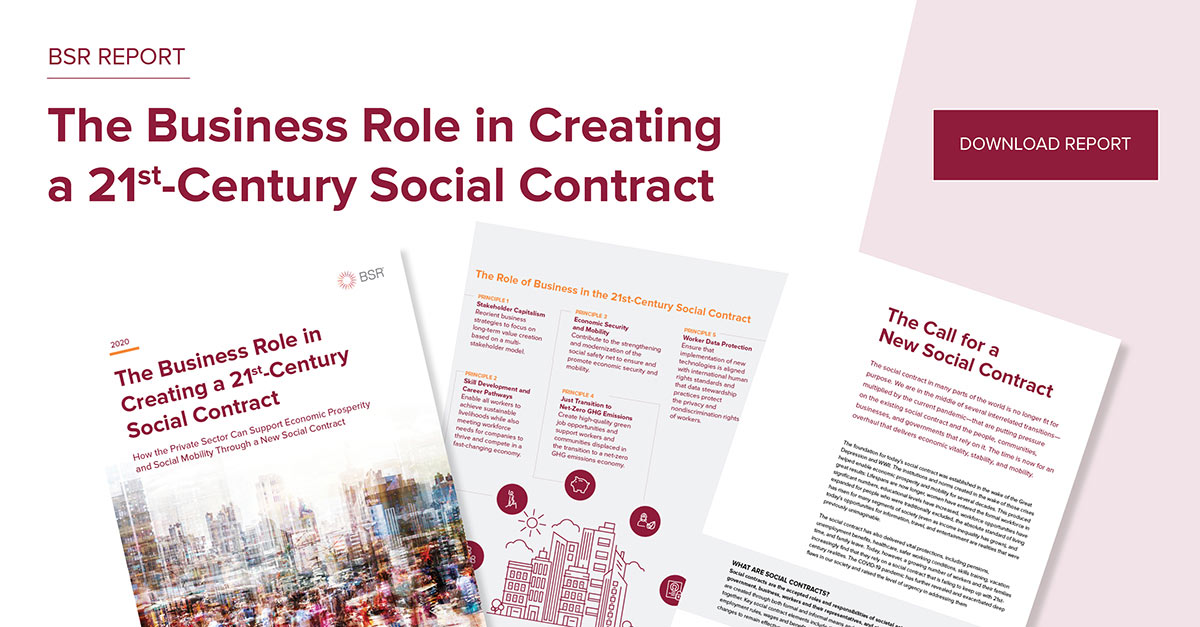120M
More than 120 million middle-skill workers in Europe and the U.S. experienced declining employment and stagnating wages between 2000 and 2018.
37%
37 percent of companies in the S&P 500 did not have a single Black board member in 2019.
$26T
Up to 65 million jobs and US$26 trillion in economic opportunities could be created by the transition to a net-zero GHG emissions economy by 2030.
The structural flaws in the social contract were already evident before 2020, and recent events have both revealed and accelerated those shortcomings in vivid ways that demand action. We now see more clearly the importance of the social safety net, functioning public health systems, and global collaboration. We see more clearly that the world remains too focused on short-term thinking, leaving us extraordinarily susceptible to shocks that create wide social and economic destruction, with the greatest impacts on the most marginalized groups. Recent events in the United States, are powerful reminders of how systemic and institutional racism continue to plague not only the U.S. but also the entire world, and they also reinforce the urgency of ensuring a social contract based on more inclusive models and practices. The rise of technologies to combat the health impacts of the coronavirus reminds us that privacy must be a core part of the development and applications of these promising tools.
We are at a hinge point in history where transformation is both possible and necessary. As we enter the decisive decade of the 2020s and aim to deliver on the Sustainable Development Goals and the Paris Agreement, it is imperative that business use its voice to act, enable, and influence, collaborating with governments, workers and their representatives, and civil society organizations to modernize the social contract. This paper outlines a framework for doing so.
A New Social Contract is Good for Business
Business has significant incentives to participate in the development of a new social contract.
- Shape the new role of business in society
- Create innovative business models, products and services
- Support and access a skilled workforce
- Respond to stakeholder expectations
- Thrive in a stable operating environment
64%
64 percent of millennials consider a company’s social and environmental commitments when deciding where to work, and 64 percent will not take a job if a company doesn’t have strong corporate social responsibility values.
91
91 companies in the Fortune 500 effectively paid no federal income taxes on their 2018 U.S. income.
30%
Only 30 percent of C-level executives are very confident that their organization is using workforce data in a highly responsible way.
Principles for Business Action to Modernize the Social Contract
This paper calls for ambitious business action to build a modern and stable pact between individuals and institutions.
Principle 1
![]()
Stakeholder Capitalism
Reorient business strategies to focus on long-term value creation based on a multi-stakeholder model.
Actions
- Align corporate strategy and key business decisions with long-term value creation for all stakeholders.
- Ensure that governance structures, including board and executive leadership, are inclusive, and consider the interests and perspectives of all.
- Design performance assessment, accountability systems, and external reporting to achieve and support long-term value creation.
- Pay fair share of taxes, report publicly on tax payments by jurisdiction, and ensure lobbying is consistent with fair tax policies.
- Reduce the earnings gap between executive and non-executive employees.
- Embed diversity, equity, and inclusion (DEI) across all aspects of business operations.
- Align policy advocacy, participation in industry associations, and monetary contributions with environmental and social objectives.
Principle 2
![]()
Skill Development and Career Pathways
Enable all workers to achieve sustainable livelihoods while also meeting workforce needs for companies to thrive and compete in a fast-changing economy.
Actions
- Create high-quality employment opportunities that support peoples’ livelihoods, resilient businesses, and healthy communities amidst deep structural change.
- Offer beneficial career pathways that meet current and future employment needs and attract, retain, and engage staff.
- Focus on DEI in hiring, training, and advancement to ensure that workforces reflect the entirety of society and that career pathways are accessible to all.
- Establish worker training programs that develop productive, adaptive, and agile workforces that boost competitiveness and innovation.
- Partner with educational institutions and skill-development programs to shape 21st-century skills curricula aligned with emerging skills gaps and future labor market needs.
Principle 3
![]()
Economic Security and Mobility
Contribute to the strengthening and modernization of the social safety net to ensure and promote economic security and mobility.
Actions
- In response to the COVID-19 pandemic, call for social safety net reforms that address both broadly applicable needs and the specific, disproportionate impacts on marginalized communities.
- Advocate for a social safety net that enables all people to meet their basic needs.
- Advocate for social safety net provisions and labor law protections to be accessible to all workers, regardless of their employment status or job classification.
- Advocate for wage levels and related income programs that enable workers to support themselves and their families. In the absence of such laws, pay a living wage to all direct employees, and encourage contractors and suppliers to also pay their workers a living wage.
- Promote full and equitable access to social infrastructure (housing, education, transport, the legal system) and technology in support of widespread economic opportunity and vitality, with specific effort to ensure that access is available to traditionally marginalized communities in general and BIPOC in particular.
Principle 4
![]()
Just Transition to Net-Zero GHG Emissions
Create high-quality green job opportunities and support workers and communities in the transition to a net-zero greenhouse gas (GHG) emissions economy.
Actions
- Generate inclusive low-carbon employment opportunities, and manage the impacts on workers transitioning from high-carbon roles.
- Advocate for policies that enable the generation of high-quality low-carbon jobs and for those displaced from high-carbon roles to shift to new livelihoods.
- Work toward a just transition for people and communities through social dialogue and stakeholder engagement.
Principle 5
![]()
Worker Data Protection
Ensure that implementation of new technologies is aligned with international human rights standards and that data stewardship practices protect the privacy and nondiscrimination rights of workers.
Actions
- Undertake forward-looking assessments into the social, economic inclusion, and human rights impacts of disruptive technologies.
- Secure meaningful and informed employee consent for worker data collection.
- Use data analytics and digital tools to enhance the recruitment and management of healthy, diverse, and inclusive workplaces.
- Advocate for new international standards and guidance on privacy in the workplace for the digital era.
Let’s talk about how BSR can help you to transform your business and achieve your sustainability goals.








